
Gwengoat/iStockBY: ELLA TORRES AND WILLIAM MANSELL
(NEW YORK) — The novel coronavirus has now killed more than 238,000 people worldwide.
Over 3.3 million people across the globe have been diagnosed with COVID-19, the disease caused by the new respiratory virus, according to data compiled by the Center for Systems Science and Engineering at Johns Hopkins University. The actual numbers are believed to be much higher due to testing shortages, many unreported cases and suspicions that some governments are hiding the scope of their nations’ outbreaks.
Since the first cases were detected in China in December, the United States has become the hardest-hit country, with more than 1.1 million diagnosed cases and at least 65,068 deaths.
Today’s biggest developments:
- US surpasses 65,000 deaths
- Mississippi extends stay-at-home order
- Here’s how the news is developing today. All times Eastern. Please refresh this page for updates.
11:59 a.m.: Fewer New Yorkers testing positive for antibodies
The rate of New Yorkers who tested positive for antibodies, meaning they had COVID-19 at some point, has decreased, Gov. Andrew Cuomo said at a briefing.
The percentage of residents who had antibodies was 12.3% as of May 1, down from 13.9% on April 22 and 14.9% on April 27, Cuomo said.
Around 15,000 people were tested in the survey, according to the governor, who touted it as the largest antibody survey in the country.
While he admitted that it was not a major decrease, it was “better than seeing it go up.”
More men than women tested positive for antibodies, the results showed, and New York City continued to have the highest reported positive tests at 19.9%. In the city, the Bronx and Brooklyn had the two highest positive antibody results.
Cuomo said health experts still are trying to determine where new cases are coming from and have asked hospitals to record from neighborhoods new patients arrive. He’s also asked hospitals to help identify how many new cases are front-line workers or people with whom they live.
Ahead of the subway’s scheduled closure from 1 a.m. to 5 a.m., starting May 6, officials discussed the logistics of the plan.
Sarah Feinberg, interim president of the New York City Transit, said that around 10,000 to 11,000 thousand people ride the subway from 1 a.m. to 5 a.m. She said transit officials know which subway stations those people use and they’re going to ramp up bus services so fewer commuters see disruptions.
President Donald Trump said there is “tremendous” testing capacity for senators returning to Washington, D.C., next week. His comments came after it was reported that Capitol physician Brian Monahan said earlier in the week that his office did not have the capacity to screen all 100 senators.
“There is tremendous CoronaVirus testing capacity in Washington for the Senators returning to Capital Hill on Monday,” Trump tweeted.
He also said that was “likewise” for the House, which he said should return but is not because of House Speaker Nancy Pelosi.
The president said the five-minute Abbott test would be used. Health and Human Services Secretary Alex Azar announced late Friday night on Twitter that the administration was sending Abbott tests to Congress.
“Good news: as the Senate reconvenes to do important work for the American people during this public health crisis, we have now received an initial request and are sending 3 Abbott point of care testing machines and 1,000 tests for their use,” Azar tweeted.
10:00 a.m.: Fauci will testify before Senate
Infectious disease expert Dr. Anthony Fauci will testify before the GOP-led Senate Committee on Health, Education, Labor and Pensions on May 12, a committee spokesperson said.
“Chairman Sen. Lamar Alexander looks forward to hearing from Dr. Fauci and other administration officials at the Senate health committee’s second hearing back, which will be on Tuesday, May 12,” the spokesperson said.
The news comes after the White House’s efforts to block Fauci from appearing before the Democratic-led House committee next week. The White House did not immediately respond to ABC News for comment.
6:45 a.m.: NCAA releases ‘core principles’ for restarting college sports
The NCAA released guidelines on Friday for how college sports will transition back campuses. Its plan closely follows the Centers for Disease Control and Prevention and Trump administration’s Opening Up America Again strategy.
Once COVID-19 infection rates decrease for at least two weeks, the NCAA said “resocialization of sport may be possible.” In its plan, put together by the COVID-19 Advisory Panel, there are nine “coreprinciples” that are a part of three phases for college sports to come back.
“The core principles outlined below are offered as a premise for resuming practice and competition at the collegiate level,” the NCAA said in a statement.
Some of the principles include that colleges must have a plan in place for students to come back, that there are adequate personal protective equipment and access to testing, there must be a surveillance program to trace and isolate new cases and more.
Phase one includes limiting gatherings to 10 people or less, keeping common areas like gyms and cafeterias closed and encouraging virtual-only meetings. Phase two includes a limit on gatherings of 50 people or more, but allows for nonessential travel to resume. After other safety benchmarks and coronavirus numbers are met, phase three allows vulnerable student-athlete to resume in-person activities, common areas open and most other restrictions are lifted.
The NCAA guidelines are all subject to federal, state and local regulations.
Since early March, all NCAA sports have been canceled, including the NCAA men’s and women’s basketball tournament.
4:10 a.m.: Mississippi extends stay-at-home order after spike in deaths
Mississippi Gov. Tate Reeves said he was prepared to unveil the easing of state restrictions Friday. He said he knows the economy needs to be reopened and that residents of his state are ready to get back to work and see a normal way of life again. However, as he was set to announce those plans Friday during the state’s task force briefing, the latest coronavirus data forced him to stop in his tracks.
Mississippi, he said, had just had its largest single-day increase in COVID-19 cases and its largest increase in deaths.
“Every single day, I have come before you and been transparent. I was transparent when I made decisions that turned out to be right. And I believe I was transparent when I made decisions that turned out to be wrong,” he said Friday.
“This thing is not over, we are not out of the woods yet. Things can change quickly. We have to stay flexible,” Reeves said during Friday’s briefing. “This was a large enough change to make me take a step back… and I have come to the conclusion that I must hold on for now.”
Reeves said he hopes to announce more reopenings soon, but the timing is not right. Meanwhile, the governor is in a battle with the state legislature over federal COVID-19 stimulus funding.
The legislature voted Friday to prevent Reeves’ office from spending federal coronavirus money, saying the executive branch shouldn’t be the sole decider on how to spend the CARES money in the state.
Reeves said that decision only delays getting much-needed funds to residents.
“Best case scenario, weeks from now, they start debating that budget. They over-estimate and we have to send a lot of your money back to the federal government when it goes unused,” Reeves said in a statement Friday night. “Worst case scenario, they underestimate and people die because we can’t get them what they need.”
Mississippi has more than 7,200 diagnosed coronavirus cases and at least 281 deaths.
Copyright © 2020, ABC Audio. All rights reserved.















